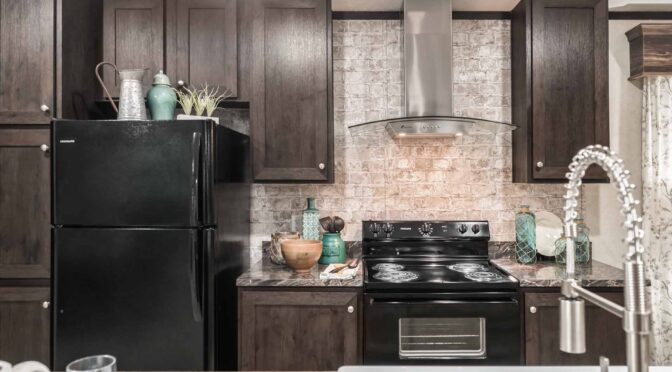 Financing a manufactured home usually works a bit differently than financing a traditional site-built home. Historically, many lenders have considered manufactured homes or older “mobile homes” to be personal property rather than real estate, which meant limited financing options. Today there are many different ways to secure financing for your next manufactured home, partly because manufactured homes are stronger, more reliable and even luxurious compared to older mobile homes created before 1976.
Financing a manufactured home usually works a bit differently than financing a traditional site-built home. Historically, many lenders have considered manufactured homes or older “mobile homes” to be personal property rather than real estate, which meant limited financing options. Today there are many different ways to secure financing for your next manufactured home, partly because manufactured homes are stronger, more reliable and even luxurious compared to older mobile homes created before 1976.
There are several different programs and loan types available that can help you afford the home you want, some even designed specifically for manufactured homes. For example, manufactured home communities usually offer in-house financing options that can get you approved quickly with less hassle than a bank or traditional lender.
Loan options available to you will depend on several factors:
- Your credit history
- Employment status and history
- Home age and location
- Loan eligibility credentials
- Loan type
Financing Options for Manufactured Homes
The best loan or mortgage for your next manufactured home will depend on many different factors that are unique to your situation. Credit history, home type and age, location, and eligibility all play a part in determining not just where you can qualify, but where and how you should choose to borrow.
The most common financing options for manufactured homes include:
Government-backed Loan Programs
As a government entity, HUD backs certain loan programs like those below. If you can qualify for any of the programs below, they are likely a great way to get a mortgage for your manufactured home.
FHA Loans
FHA loans are one of the few financing options that work the same way for manufactured homes as they do for traditional homes. FHA does not lend money itself, but rather insures the lender that this entity will continue to repay your loan if you become unable to do so. Based on your credit score you may have to pay a significant percentage down, but FHA loans typically have low interest rates, and these are fixed for the entire term of the loan (generally 20 years.)
Other requirements exist that must be met before you can qualify for an FHA loan. For example, the home must be used as the primary residence of the borrower. The manufactured home also must carry insurance if new, and must not be located within a flood zone. As with most loans, you also need to be able to demonstrate that you have adequate and stable income in order to make payments on the mortgage.
VA Loans
If you have served in the military you can qualify for loans that are available to veterans only. The Department of Veteran Affairs will insure loans for those that can prove their veteran status, offering even as much as 100% financing for manufactured home and land purchases. Like FHA, VA loan terms are typically shorter, usually ranging from 20 – 25 years depending on the type and value of the home.
USDA Rural Housing Loans
USDA Rural Housing loans may be an option for those looking to live in rural areas with their manufactured home. If you meet income eligibility requirements, you could qualify for a loan that meets up to 100% of your mortgage and requires no initial down payment, leaving you with very few out-of-pocket expenses. One important thing to note is that this loan is only an option if the manufactured home is brand new.
Conventional Mortgage Loans
Many lenders are starting to offer conforming mortgages for manufactured homes, which are the standard for traditional homes, as long as the home is classified as real estate. This category contains loans like Fannie Mae and Freddie Mac loans, which require you to meet a number of eligibility criteria. Usually, the home must be newer than 15 years old, be permanently affixed to the ground, and meet certain construction and energy standards that are similar to those of a traditional home. Qualified borrowers may be able to choose between fixed-rate mortgages and adjustable-rate mortgages, and down payments on these loans are typically lower than traditional home mortgages.
Chattel Loans
A chattel mortgage is a specific type of personal loan that can be used to purchase a manufactured home. This loan type applies to homes that are classified as personal property, but not to homes that are categorized as real estate. Chattel loans actually work more like a lien that the lender holds against your property until it is paid in full, so technically your property could be repossessed if you can’t make your payments before it is paid off.
Chattel loans often have shorter terms than traditional mortgages. The biggest benefit to these loans is that the closing process is usually faster with less restrictions involved, and closing fees are usually much lower than some other mortgages. You can be approved for a chattel loan even if you do not own or plan to own the land your manufactured home will be placed on, making it a popular financing option for home buyers who plan to rent space in a manufactured home community.
Personal Loans
Personal loans are not actually attached to the home or property, which can be helpful if purchasing a manufactured home that doesn’t qualify easily for a standard mortgage loan. Approval times are typically fast (a week or so), approval rates are higher, and the condition of the home doesn’t affect the loan. You typically just need to be a U.S. citizen or permanent resident, have a steady income, and a positive recent credit history. Some personal property loans also require you to have at least five percent down and a reasonably new home. Maximum loan amounts very between lenders but usually top at around $50,000. Some will approve up to $100,000 for qualified borrowers.
Banks and Credit Unions
Each bank offers different financing options for manufactured homes, and each one structures its loans differently. If you’re determined to get a loan from a bank or credit union you’ll need to talk to representatives from multiple institutions to get a lay of the land and make the best decision. You’re more likely to end up with a personal loan than a conventional mortgage from banks, but some now have mortgage programs specifically for manufactured homes. They may offer long term plans with low monthly payments, but interest rates could be high depending on the loan. Some credit unions or banks also offer insurance as well. This can be nice for streamlined payments, but beware of premium charges for bundling insurance with financing.
Manufactured Home Community Financing
If you’re looking at manufactured homes in a community setting, it’s a great idea to consider in-house financing with your community of choice. Community loan partners typically offer financing options with less red tape than banks or other lending institutions, meaning a smoother process and greater likelihood of approval. They also specialize in financing manufactured homes, so they are a much better resource for questions and tips around specific loan types. Generally, manufactured home communities can also sell their homes at a lower price than other retailers, which can also mean lower down payments and overall cost.
Steps to Get Financing for Manufactured Homes
Follow these steps to make sure you are well prepared to select the financing option that is best for your new manufactured home purchase.
1. Check your credit report
A lender will always consider your credit score and recent credit history when making decisions about loan approval, no matter the type of loan, so you should review this info before applying to know where to stand. Checking your credit can be done easily through a credit bureau such as Experian, TransUnion or Equifax. Clean credit histories and good credit scores made it easier to secure loan approval in general, and will also get you a lower interest rate. Lower interest rates can save you thousands of dollars over the course of loan repayment.
2. Decide whether you are also buying land for your home
If you plan to buy land where you can place your manufactured home, this may actually help you qualify for certain loans that aren’t available to those who plan to rent a plot of land. Permanent manufactured home structures can sometimes be approved for traditional mortgages. If you are simply planning to purchase the home to live on rented land, such as a lot in a manufactured home community, you will need to consider alternative financing options like chattel and personal loans.
3. Determine details about the home you plan to purchase
The type and age of the home you’re buying will affect the loans you may be eligible to receive. For example, if you plan to buy a double-wide manufactured home that costs over $100,000, you won’t be eligible for an FHA loan. Older mobile homes may not qualify for financing as easily, depending on the condition of the home and the lender’s eligibility requirements. All lenders have specific lending criteria that determine loan approval based on the value of the home and your ability to pay it back.
4. Explore and compare financing options
It’s important to do your research on the type of loans available for your specific situation, and then to compare fees and interest rates between several different lenders. This is the best way to make sure you find a lender you trust that has the lowest fees and rates possible, saving you money in the long run. Ideally you will start this process well before you have a home ready to buy, so you avoid feeling pressured to sign a high-interest loan just to make a quick purchase happen. If you are considering a manufactured home community, check to see if the community’s financing partner offers the best rates and options for you.
5. Submit a loan application
Make sure that you have all of your materials ready and organized so you can complete the entire loan application process smoothly with no hold-ups. This will give you the best chance of swiftly being approved by the lender. Be as comprehensive and transparent as possible in your application to avoid any confusion or hesitation with your approval. Many financial institutions will require an up front fee or a down payment in order to complete the application, so you may need to prepare for this as well. Submitting a loan application through a particular manufactured home community is often the smoothest process if you are looking to live in that neighborhood.
Smart Financing to Get the Home You Deserve
With so many options and variables related to manufactured homes, it’s no wonder that the process can seem overwhelming. The key to choosing the right financing option for you is to do your research, talk with experts you trust, and consider all of your choices carefully. These are big decisions that will follow you into the future, so a financing decision is not something to rush!
Manufactured home communities can be great resources when it comes to financing info. They can give you details on the application process, offer examples of financing options that have worked for others, and even have partnerships with specific institutions that can streamline loan approval. Learn more about financing with an FR Community partner lender.



